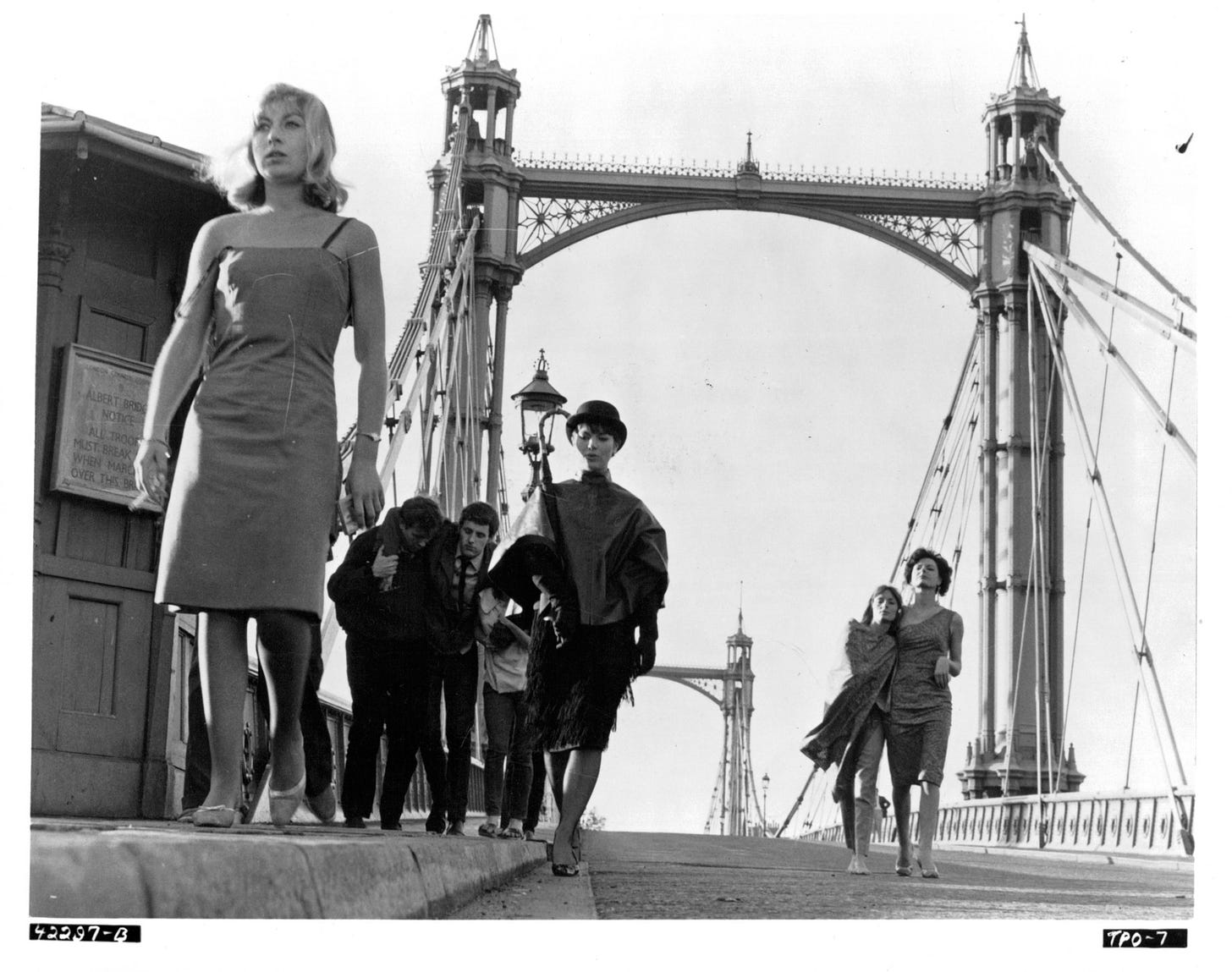Electric Theatre: The Party's Over (1965)
Mike Sizemore follows Oli Reed over a bridge to nowhere
Electric Theatre is our rotating, monthly column, where we look at London on film. It’s an opportunity to see how the city has been represented on the big screen over the years, how its landmarks and structures have been used (and abused) and how various genres and directors extract wildly different performances from its streets.
You can find the archive of Electric Theatre installments right here.
For this issue, we welcome back screenwriter, writer and graphic novelist Mike Sizemore, who has chosen to travel back to the seedy bars and bedsits of swinging London and gatecrash Oliver Reed’s never-ending party.
Welcome to the Electric Theatre. Please turn off your phones and refrain from talking for the duration of the entertainment.

“‘The ‘beat’ way of life is very sinister and it is no good pretending otherwise if we are going to allow it to be shown at all.’" – 1962 BBFC note on the script for ‘The Party’s Over’.
Autumn 1962 and with a few beers under your belt, you find yourself in SW3 in the early hours of the morning looking for a party to crash.
Music from a dilapidated building draws you in and, ignoring the warning signs telling you the place is unsafe and marked for demolition, you find your way inside. It’s a wild scene. Walls have been knocked through to allow the party to wrap around the interior like a snake. You spark up a conversation with a young pretty thing and discover you’re at a wrap party. A film completed its production here just a few hours earlier and the cast and crew are celebrating in style. That explains the bath tub filled with ice and champagne.
You drink freely, perhaps a little too much. You say the wrong thing to the wrong person and suddenly you and your friend are singled out as interlopers. You try and bluff it out, but you’re getting increasingly nervous as you watch one man being restrained by the others. They’re doing their best to hold him back, but his eyes are fixed on you like a shark and inch by inch he’s getting closer. It’s not that he’s angry, although he obviously is, it’s the smile that breaks you. You’re not an annoyance to this guy, you’re an opportunity. You turn quickly to the exit. The voice from the make-shift bar follows you out, “That’s right. Fuck off before he tears you limb from limb…”
The voice belongs to producer Anthony Perry and the ‘he’ he is referring to is 25-year-old Oliver Reed. The film they have just finished is The Party’s Over and together they are about to scandalise the British Film Industry.1
Welcome to the party, pal
It’s fascinating that such a towering presence of British cinema as Oliver Reed should have so many obscure movies in his filmography. Understandably the films he made as his career declined are often maligned, if also bonkers and incredibly enjoyable.
Once the great and even good scripts dried up, he was left to face off against one killer snake (and Klaus Kinski) in Venom (1981) and form a telepathic link with another killer snake in Spasms (1983). But twenty years earlier he was very much in his prime and outshining everyone around him in a series of very different movies which have also never been considered crowd pleasers.
Perhaps the most notorious was 1965’s The Party’s Over - a sort of mystery movie set in the seedy beatnik underground of swinging London. It’s a quality movie that was held back from release for a number of years because of one particular unpalatable aspect. It was finally pushed out quietly in a cut version, that appalled the director and producers enough for them to disown it and have their names struck from the credits.
The plot is simple. A young, wealthy American woman (Louise Sorel, in her big screen debut) has lost herself in the arty, but messy, free-spirited bohemian Chelsea and Battersea. Her strait-laced fiancé, Clifford David, is dispatched by her father to bring her home. The only problem is he can’t find her.
Reed plays the mischievous leader of Sorel’s new friends who, infatuated with her, leads her fiancé a merry dance by placing obstacles in his way. The stakes are raised by a second act tragedy revolving around a drunken soirée that is slowly revealed in shocking flashbacks. To reveal the incident would spoil the movie although nearly every online synopsis mentions it because of the film’s notoriety. If you can go in blind all the better and the cut version of the film is available to rent or buy on most streaming services.
Oliver’s army
So why should you watch it? First and foremost, for Reed’s performance.
Keep reading with a 7-day free trial
Subscribe to London in Bits to keep reading this post and get 7 days of free access to the full post archives.



